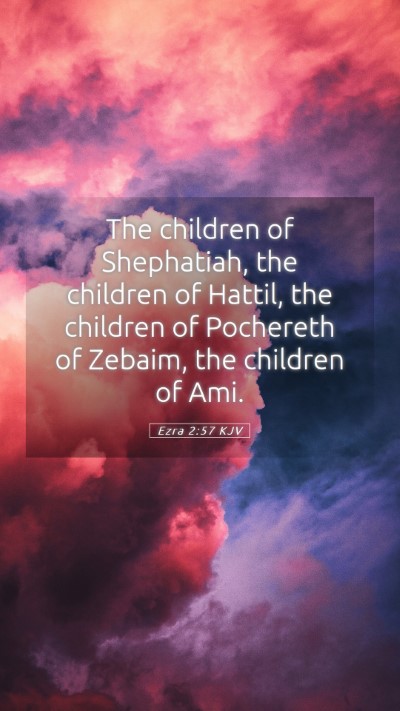Ezra 2:57 - Biblical Context and Meaning
Ezra 2:57 states: "The children of Solomon's servants: the children of Sotai, the children of Sophereth, the children of Peruda," providing a glimpse into the lineage and roles of those who returned from Babylonian exile to Jerusalem. This passage is part of a larger enumeration of the people who returned to rebuild the temple, with each name carrying significance in the context of restoration and community.
Bible Verse Meanings and Interpretations
This verse sheds light on the importance of genealogy and identity in the Israelite community. Matthew Henry notes that recognizing these names serves to affirm the faithful remnant of Israel, reinforcing their covenant relationship with God. Albert Barnes points out that the descendants of Solomon's servants signify continuity in heritage, linking the exiled community back to a royal lineage, which stresses the importance of their role in the rebuilding project.
Understanding Scripture through Historical Context
Understanding this verse requires exploring its historical context. Adam Clarke emphasizes that these individuals belonged to a specific class of servants who helped manage the royal estate during Solomon's reign. Their return indicates a restoration of not only physical structures but also of community responsibilities within Israel. This reflects a theme throughout the scriptures where God preserves a remnant of His people to fulfill His promises.
- 1. Genealogy as Identity: The list of returnees reinforces the identity and continuity of the Jews as God’s chosen people.
- 2. Restoration Themes: The return from exile showcases God's faithfulness in restoring His people and their land.
- 3. The Role of Servants: It highlights the importance of all individuals, including those considered servants, within God's salvific plan.
Scripture Analysis and Biblical Exegesis
The names in Ezra 2:57 carry theological weight beyond mere historical record. They represent a diverse community working together. Bible study insights indicate that every member, whether of nobility or servitude, had a crucial role in God's mission. This inclusivity is further explored in Nehemiah and the intertwining discussions regarding those who contributed to the restoration efforts.
Significance and Application of Ezra 2:57
The significance of this verse can also be laid against modern applications. It can prompt readers to reflect on their identities within their own communities, urging them to consider how they can contribute to collective restoration efforts among their peers or in spiritual contexts. Applying scripture analysis reveals that each name represents people called to serve a purpose, echoing the call for modern believers to engage actively in their churches and communities.
Bible Study Topics and Resources
Individuals seeking deeper understanding can explore various Bible study guides and resources focused on the themes of community, restoration, and God’s promises. In-depth Bible verse analysis of verses like Ezra 2:57 can be fruitful for online Bible study groups and classes oriented around historical and prophetic narratives in the Old Testament.
Related Bible Verses
- Nehemiah 7:57 - Another list of descendents reflecting continuity and the importance of heritage.
- Jeremiah 29:10-14 - God's promise of restoration to the exiles.
- Isaiah 44:26-28 - Prophecy regarding the restoration of Israel.
- Zechariah 1:16 - God’s promise to return and bless His people.
- Psalm 126:1-3 - A song of ascent reflecting joy at returning from exile.
- Ezra 3:1-2 - The beginning of the rebuilding efforts in Jerusalem.
Conclusion
In summary, Ezra 2:57 serves as an important marker in understanding the importance of genealogy, community participation in restoration, and the continuity of God’s covenant promises. It provides deep insights into the role of every member of the community in fulfilling God’s plans and highlights the themes of identity and restoration, which continue to resonate in the lives of believers today.


